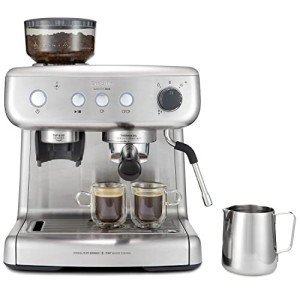20 Insightful Quotes About Home Use Espresso Machines

Home Use Espresso Machines: A Comprehensive Guide
Espresso machines have actually become a staple in numerous families as coffee enthusiasts seek to duplicate café-quality brews in the convenience of their kitchen areas. The increase in appeal has actually caused a diverse market filled with different models, functions, and rates. This short article intends to supply an informative summary of home use espresso machines, assisting readers navigate their alternatives effectively.
Understanding Espresso Machines
Espresso machines work by forcing warm water through finely-ground coffee under high pressure, leading to a concentrated coffee drink referred to as espresso. There are several types of espresso machines categorized based upon their brewing approaches and level of automation. The most common types include:
- Manual Espresso Machines: These need the user to manage the pressure and water flow, enabling for a more hands-on coffee-making experience.
- Semi-Automatic Espresso Machines: These provide automatic control over water pressure, while the user manually grinds and tamps the coffee.
- Automatic Espresso Machines: With the push of a button, these machines instantly manage the flow of water, making it much easier to brew espresso with constant outcomes.
- Super-Automatic Espresso Machines: These all-in-one machines deal with grinding, tampering, developing, and even milk frothing, making them perfect for users looking for convenience.
- Capsule or Pod Machines: These use pre-packaged coffee pods to develop espresso with very little effort, however they restrict option in developing methods and tastes.
Table: Comparison of Espresso Machine Types
| Type | Control Level | Alleviate of Use | Cleaning up Level | Ideal For |
|---|---|---|---|---|
| Manual | User-controlled | Moderate | High | Coffee purists |
| Semi-Automatic | Partial automation | Moderate | Moderate | Home baristas |
| Automatic | Totally automated | Easy | Low | Hectic individuals |
| Super-Automatic | Totally automated | Extremely easy | Extremely low | Convenience seekers |
| Capsule/Pod | Completely automated | Very easy | Very low | Casual drinkers |
Secret Features to Consider
When selecting a home use espresso machine, it's important to consider various features that can significantly impact the quality of espresso and user experience.
- Pressure: Look for machines that provide a minimum of 9 bars of pressure, as this is considered optimal for brewing espresso.
- Boiler Systems: Single vs. dual boiler systems figure out temperature stability and the ability to brew espresso and steam milk simultaneously.
- Grinder: Integrated mills enable freshly ground coffee, which enhances flavor. Think about machines with adjustable grind settings.
- Milk Frother: For those who delight in coffees and lattes, a built-in steam wand or automatic frother is vital.
- Size and Design: Consider your cooking area space and aesthetic preferences. Machines can be found in different sizes, from compact to large setups.
- Price: Home espresso machines can range from a few hundred to several thousand dollars, so it's vital to establish a budget before exploring choices.
Pros and Cons of Home Use Espresso Machines
| Pros | Cons |
|---|---|
| Convenience of brewing coffee at home | Initial financial investment can be high |
| Quality of espresso is frequently remarkable | Requires some skill, specifically with manual machines |
| Capability to try out flavors | Maintenance and cleaning can be labor-intensive |
| Can save cash in the long run | Not all machines will match every coffee preference |
Maintenance and Cleaning Tips
Maintaining an espresso machine is crucial for extending its life and ensuring constant brew quality. Here are some helpful ideas:
- Regular Descaling: Minerals from water can develop in the machine. Descale every 1-3 months, depending on water solidity.
- Daily Cleaning: Rinse portafilters, baskets, and steam wands after each use to avoid coffee oils from building residue.
- Use Filtered Water: This can help in reducing mineral buildup and enhance the taste of coffee.
- Replace Gaskets and Seals: These components might wear gradually and should be changed to preserve pressure and performance.
- Check out the Manual: Each machine has particular care directions; following these will guarantee longevity.
FAQs About Home Use Espresso Machines
Q1: What is the very best budget espresso machine?The best budget espresso machine often depends upon private requirements, but designs like the DeLonghi EC155 or the Breville Bambino are popular among users for supplying great worth. Q2: How long do home espresso machines normally last?With proper upkeep, home espresso machines can last anywhere from 5 to 15 years, depending on the quality of the machine and frequency of use. Q3: Can I make coffees and lattes with any espresso machine?While most espresso machines can make cappuccinos and lattes, having a reputable
steam wand or frother is essential for attaining the right milk texture.
Q4: Are super-automatic machines worth the investment?For Professional Espresso Machines who prioritize convenience and quick developing, super-automatic machines can be worth the financial investment, though they may do not have some customizability in brew strength and flavor. Q5: What types of coffee beans are best for espresso?While personal choice plays a role, beans labeled as" espresso "blends are usually roasted darker, developing abundant tastes and a creamy texture when brewed.
Investing in a home espresso machine can transform the daily coffee regimen into something unique, elevating home brews to café quality. By understanding the various types of machines, essential functions to think about, upkeep requirements, and weighing the
benefits and drawbacks, consumers can make informed decisions that match their individual choices. As the espresso culture continues to grow, no matter the choice, every brew can be a delicious experience waiting to be enjoyed.

